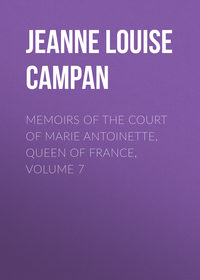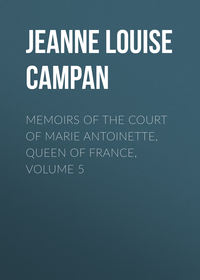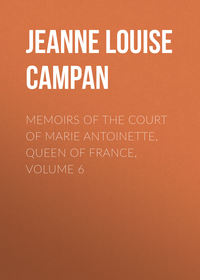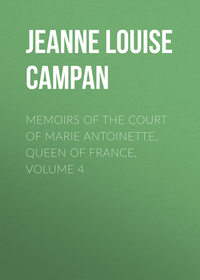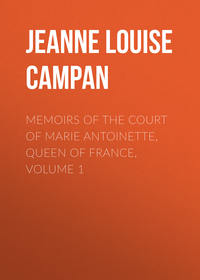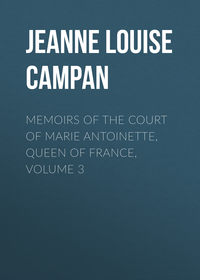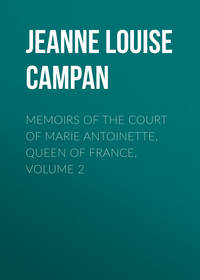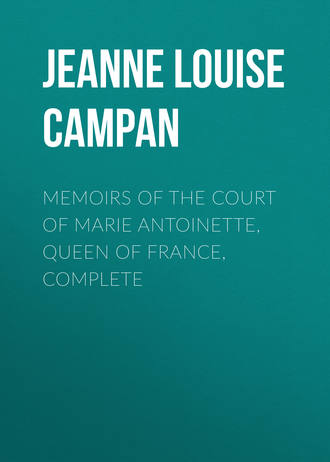 полная версия
полная версияMemoirs of the Court of Marie Antoinette, Queen of France, Complete
A kind of proscenium, which could be taken down and shut up in a closet, formed the whole theatre. The Comte de Provence always knew his part with imperturbable accuracy; the Comte d’Artois knew his tolerably well, and recited elegantly; the Princesses acted badly. The Dauphiness acquitted herself in some characters with discrimination and feeling. The chief pleasure of this amusement consisted in all the costumes being elegant and accurate. The Dauphin entered into the spirit of these diversions, and laughed heartily at the comic characters as they came on the scene; from these amusements may be dated his discontinuance of the timid manner of his youth, and his taking pleasure in the society of the Dauphiness.
It was not till a long time afterwards that I learnt these particulars, M. Campan having kept the secret; but an unforeseen event had well-nigh exposed the whole mystery. One day the Queen desired M. Campan to go down into her closet to fetch something that she had forgotten; he was dressed for the character of Crispin, and was rouged. A private staircase led direct to the entresol through the dressing-room. M. Campan fancied he heard some noise, and remained still, behind the door, which was shut. A servant belonging to the wardrobe, who was, in fact, on the staircase, had also heard some noise, and, either from fear or curiosity, he suddenly opened the door; the figure of Crispin frightened him so that he fell down backwards, shouting with his might, “Help! help!” My father-in-law raised him up, made him recognise his voice, and laid upon him an injunction of silence as to what he had seen. He felt himself, however, bound to inform the Dauphiness of what had happened, and she was afraid that a similar occurrence might betray their amusements. They were therefore discontinued.
The Princess occupied her time in her own apartment in the study of music and the parts in plays which she had to learn; the latter exercise, at least, produced the beneficial effect of strengthening her memory and familiarising her with the French language.
While Louis XV. reigned, the enemies of Marie Antoinette made no attempt to change public opinion with regard to her. She was always popular with the French people in general, and particularly with the inhabitants of Paris, who went on every opportunity to Versailles, the majority of them attracted solely by the pleasure of seeing her. The courtiers did not fully enter into the popular enthusiasm which the Dauphiness had inspired; the disgrace of the Duc de Choiseul had removed her real support from her; and the party which had the ascendency at Court since the exile of that minister was, politically, as much opposed to her family as to herself. The Dauphiness was therefore surrounded by enemies at Versailles.
Nevertheless everybody appeared outwardly desirous to please her; for the age of Louis XV., and the apathetic character of the Dauphin, sufficiently warned courtiers of the important part reserved for the Princess during the following reign, in case the Dauphin should become attached to her.
CHAPTER IV
About the beginning of May, 1774, Louis XV., the strength of whose constitution had promised a long enough life, was attacked by confluent smallpox of the worst kind. Mesdames at this juncture inspired the Dauphiness with a feeling of respect and attachment, of which she gave them repeated proofs when she ascended the throne. In fact, nothing was more admirable nor more affecting than the courage with which they braved that most horrible disease. The air of the palace was infected; more than fifty persons took the smallpox, in consequence of having merely loitered in the galleries of Versailles, and ten died of it.
The end of the monarch was approaching. His reign, peaceful in general, had inherited strength from the power of his predecessor; on the other hand, his own weakness had been preparing misfortune for whoever should reign after him. The scene was about to change; hope, ambition, joy, grief, and all those feelings which variously affected the hearts of the courtiers, sought in vain to disguise themselves under a calm exterior. It was easy to detect the different motives which induced them every moment to repeat to every one the question: “How is the King?” At length, on the 10th of May, 1774, the mortal career of Louis XV. terminated.
[Christopher de Beaumont, Archbishop of Paris, the ardent apostle of frequent communion, arrived at Paris with the intention of soliciting, in public, the administration of the sacrament to the King, and secretly retarding it as much as possible. The ceremony could not take place without the previous and public expulsion of the, concubine, according to the canons of the Church and the Jesuitical party, of which Christopher was the leader. This party, which had made use of Madame du Barry to suppress the Parliaments, to support the Duc d’Aiguillon, and ruin the Choiseul faction, could not willingly consent to disgrace her canonically. The Archbishop went into the King’s bedchamber, and found there Madame Adelaide, the Duc d’Aumont, the Bishop of Senlis, and Richelieu, in whose presence he resolved not to say one word about confession for that day. This reticence so encouraged Louis XV. that, on the Archbishop withdrawing, he had Madame du Barry called in, and kissed her beautiful hands again with his wonted affection. On the 2d of May the King found himself a little better. Madame du Barry had brought him two confidential physicians, Lorry and Borden, who were enjoined to conceal the nature of his sickness from him in order to keep off the priests and save her from a humiliating dismissal. The King’s improvement allowed Madame du Barry to divert him by her usual playfulness and conversation. But La Martiniere, who was of the Choiseul party, and to whom they durst not refuse his right of entry, did not conceal from the King either the nature or the danger of his sickness. The King then sent for Madame du Barry, and said to her: “My love, I have got the smallpox, and my illness is very dangerous on account of my age and other disorders. I ought not to forget that I am the most Christian King, and the eldest son of the Church. I am sixty-four; the time is perhaps approaching when we must separate. I wish to prevent a scene like that of Metz.” (when, in 1744, he had dismissed the Duchesse de Chateauroux.) “Apprise the Duc d’Aiguillon of what I say, that he may arrange with you if my sickness grows worse; so that we may part without any publicity.” The Jansenists and the Duc de Choiseurs party publicly said that M. d’Aiguillon and the Archbishop had resolved to let the King die without receiving the sacrament rather than disturb Madame du Barry. Annoyed by their remarks, Beaumont determined to go and reside at the Lazaristes, his house at Versailles, to avail himself of the King’s last moments, and sacrifice Madame du Barry when the monarch’s condition should become desperate. He arrived on the 3d of May, but did not see the King. Under existing circumstances, his object was to humble the enemies of his party and to support the favourite who had assisted to overcome them.
A contrary zeal animated the Bishop of Carcassonne, who urged that “the King ought to receive the sacrament; and by expelling the concubine to give an example of repentance to France and Christian Europe, which he had scandalised.”—“By what right,” said Cardinal de la Roche-Aymon, a complaisant courtier with whom the Bishop was at daggers drawn, “do you instruct me?”—“There is my authority,” replied the Bishop, holding up his pectoral cross. “Learn, monseigneur, to respect it, and do not suffer your King to die without the sacraments of the Church, of which he is the eldest son.” The Duc d’Aiguillon and the Archbishop, who witnessed the discussion, put an end to it by asking for the King’s orders relative to Madame du Barry. “She must be taken quietly to your seat at Ruelle,” said the King; “I shall be grateful for the care Madame d’Aiguillon may take of her.”
Madame du Barry saw the King again for a moment on the evening of the 4th, and promised to return to Court upon his recovery. She was scarcely gone when the King asked for her. “She is gone,” was the answer. From that moment the disorder gained ground; he thought himself a dead man, without the possibility of recovery. The 5th and 6th passed without a word of confession, viaticum, or extreme unction. The Duc de Fronsac threatened to throw the Cure of Versailles out of the window if he dared to mention them, but on the 7th, at three in the morning, the King imperatively called for the Abbe Maudous. Confession lasted seventeen minutes. The Ducs de la Vrillilere and d’Aiguillon wished to delay the viaticum; but La Martiniere said to the King: “Sire, I have seen your Majesty in very trying circumstances; but never admired you as I have done to-day. No doubt your Majesty will immediately finish what you have so well begun.” The King had his confessor Maudoua called back; this was a poor priest who had been placed about him for some years before because he was old and blind. He gave him absolution.
The formal renunciation desired by the Choiseul party, in order to humble and annihilate Madame du Barry with solemnity, was no more mentioned. The grand almoner, in concert with the Archbishop, composed this formula, pronounced in presence of the viaticum: “Although the King owes an account of his conduct to none but God, he declares his repentance at having scandalised his subjects, and is desirous to live solely for the maintenance of religion and the happiness of his people.”
On the 8th and 9th the disorder grew worse; and the King beheld the whole surface of his body coming off piecemeal and corrupted. Deserted by his friends and by that crowd of courtiers which had so long cringed before him, his only consolation was the piety of his daughters.—SOULAVIE, “Historical and Political Memoirs,” vol. i.]
The Comtesse du Barry had, a few days previously, withdrawn to Ruelle, to the Duc d’Aiguillon’s. Twelve or fifteen persons belonging to the Court thought it their duty to visit her there; their liveries were observed, and these visits were for a long time grounds for disfavour. More than six years after the King’s death one of these persons being spoken of in the circle of the royal family, I heard it remarked, “That was one of the fifteen Ruelle carriages.”
The whole Court went to the Chateau; the oiel-de boeuf was filled with courtiers, and the palace with the inquisitive. The Dauphin had settled that he would depart with the royal family the moment the King should breathe his last sigh. But on such an occasion decency forbade that positive orders for departure should be passed from mouth to mouth. The heads of the stables, therefore, agreed with the people who were in the King’s room, that the latter should place a lighted taper near a window, and that at the instant of the King’s decease one of them should extinguish it.
The taper was extinguished. On this signal the Body Guards, pages, and equerries mounted on horseback, and all was ready for setting off. The Dauphin was with the Dauphiness. They were expecting together the intelligence of the death of Louis XV. A dreadful noise, absolutely like thunder, was heard in the outer apartment; it was the crowd of courtiers who were deserting the dead sovereign’s antechamber, to come and do homage to the new power of Louis XVI. This extraordinary tumult informed Marie Antoinette and her husband that they were called to the throne; and, by a spontaneous movement, which deeply affected those around them, they threw themselves on their knees; both, pouring forth a flood of tears, exclaimed: “O God! guide us, protect us; we are too young to reign.”
The Comtesse de Noailles entered, and was the first to salute Marie Antoinette as Queen of France. She requested their Majesties to condescend to quit the inner apartments for the grand salon, to receive the Princes and all the great officers, who were desirous to do homage to their new sovereigns. Marie Antoinette received these first visits leaning upon her husband, with her handkerchief held to her eyes; the carriages drove up, the guards and equerries were on horseback. The Chateau was deserted; every one hastened to fly from contagion, which there was no longer any inducement to brave.
On leaving the chamber of Louis XV., the Duc de Villequier, first gentleman of the bedchamber for the year, ordered M. Andouille, the King’s chief surgeon, to open the body and embalm it. The chief surgeon would inevitably have died in consequence. “I am ready,” replied Andouille; “but while I operate you shall hold the head; your office imposes this duty upon you.” The Duke went off without saying a word, and the corpse was neither opened nor embalmed. A few under-servants and workmen continued with the pestiferous remains, and paid the last duty to their master; the surgeons directed that spirits of wine should be poured into the coffin.
The entire Court set off for Choisy at four o’clock; Mesdames the King’s aunts in their private carriage, and the Princesses under tuition with the Comtesse de Marsan and the under-governesses. The King, the Queen, Monsieur, the King’s brother, Madame, and the Comte and Comtesse d’Artois went in the same carriage. The solemn scene that had just passed before their eyes, the multiplied ideas offered to their imaginations by that which was just opening, had naturally inclined them to grief and reflection; but, by the Queen’s own confession, this inclination, little suited to their age, wholly left them before they had gone half their journey; a word, drolly mangled by the Comtesse d’Artois, occasioned a general burst of laughter; and from that moment they dried their tears.
The communication between Choisy and Paris was incessant; never was a Court seen in greater agitation. What influence will the royal aunts have,—and the Queen? What fate is reserved for the Comtesse du Barry? Whom will the young King choose for his ministers? All these questions were answered in a few days. It was determined that the King’s youth required a confidential person near him; and that there should be a prime minister. All eyes were turned upon De Machault and De Maurepas, both of them much advanced in years. The first had retired to his estate near Paris; and the second to Pont Chartrain, to which place he had long been exiled. The letter recalling M. de Machault was written, when Madame Adelaide obtained the preference of that important appointment for M. de Maurepas. The page to whose care the first letter had been actually consigned was recalled.
The Duc d’Aiguillon had been too openly known as the private friend of the King’s mistress; he was dismissed. M. de Vergennes, at that time ambassador of France at Stockholm, was appointed Minister for Foreign Affairs; Comte du Muy, the intimate friend of the Dauphin, the father of Louis XVI.[?? D.W.], obtained the War Department. The Abbe Terray in vain said, and wrote, that he had boldly done all possible injury to the creditors of the State during the reign of the late King; that order was restored in the finances; that nothing but what was beneficial to all parties remained to be done; and that the new Court was about to enjoy the advantages of the regenerating part of his plan of finance; all these reasons, set forth in five or six memorials, which he sent in succession to the King and Queen, did not avail to keep him in office. His talents were admitted, but the odium which his operations had necessarily brought upon his character, combined with the immorality of his private life, forbade his further stay at Court; he was succeeded by M. de Clugny. De Maupeou, the chancellor, was exiled; this caused universal joy. Lastly, the reassembling of the Parliaments produced the strongest sensation; Paris was in a delirium of joy, and not more than one person in a hundred foresaw that the spirit of the ancient magistracy would be still the same; and that in a short time it would make new attempts upon the royal authority. Madame du Barry had been exiled to Pont-aux-Dames. This was a measure rather of necessity than of severity; a short period of compulsory retreat was requisite in order completely to break off her connections with State affairs. The possession of Louveciennes and a considerable pension were continued to her.
[The Comtesse du Barry never forgot the mild treatment she experienced from the Court of Louis XVI.; during the most violent convulsions of the Revolution she signified to the Queen that there was no one in France more grieved at the sufferings of her sovereign than herself; that the honour she had for years enjoyed, of living near the throne, and the unbounded kindness of the King and Queen, had so sincerely attached her to the cause of royalty that she entreated the Queen to honour her by disposing of all she possessed. Though they did not accept her offer, their Majesties were affected at her gratitude. The Comtesse du Barry was, as is well known, one of the victims of the Revolution. She betrayed at the last great weakness, and the most ardent desire to live. She was the only woman who wept upon the scaffold and implored for mercy. Her beauty and tears made an impression on the populace, and the execution was hurried to a conclusion.—MADAME CAMPAN.]
Everybody expected the recall of M. de Choiseul; the regret occasioned by his absence among the numerous friends whom he had left at Court, the attachment of the young Princess who was indebted to him for her elevation to the throne of France, and all concurring circumstances, seemed to foretell his return; the Queen earnestly entreated it of the King, but she met with an insurmountable and unforeseen obstacle. The King, it is said, had imbibed the strongest prejudices against that minister, from secret memoranda penned by his father, and which had been committed to the care of the Duc de La Vauguyon, with an injunction to place them in his hands as soon as he should be old enough to study the art of reigning. It was by these memoranda that the esteem which he had conceived for the Marechal du Muy was inspired, and we may add that Madame Adelaide, who at this early period powerfully influenced the decisions of the young monarch, confirmed the impressions they had made.
The Queen conversed with M. Campan on the regret she felt at having been unable to procure the recall of M. de Choiseul, and disclosed the cause of it to him. The Abbe de Vermond, who, down to the time of the death of Louis XV., had been on terms of the strictest friendship with M. Campan, called upon him on the second day after the arrival of the Court at Choisy, and, assuming a serious air, said, “Monsieur, the Queen was indiscreet enough yesterday to speak to you of a minister to whom she must of course be attached, and whom his friends ardently desire to have near her; you are aware that we must give up all expectation of seeing the Duke at Court; you know the reasons why; but you do not know that the young Queen, having mentioned the conversation in question to me, it was my duty, both as her preceptor and her friend, to remonstrate severely with her on her indiscretion in communicating to you those particulars of which you are in possession. I am now come to tell you that if you continue to avail yourself of the good nature of your mistress to initiate yourself in secrets of State, you will have me for your most inveterate enemy. The Queen should find here no other confidant than myself respecting things that ought to remain secret.” M. Campan answered that he did not covet the important and dangerous character at the new Court which the Abbe wished to appropriate; and that he should confine himself to the duties of his office, being sufficiently satisfied with the continued kindness with which the Queen honoured him. Notwithstanding this, however, he informed the Queen, on the very same evening, of the injunction he had received. She owned that she had mentioned their conversation to the Abbe; that he had indeed seriously scolded her, in order to make her feel the necessity of being secret in concerns of State; and she added, “The Abbe cannot like you, my dear Campan; he did not expect that I should, on my arrival in France, find in my household a man who would suit me so exactly as you have done. I know that he has taken umbrage at it; that is enough. I know, too, that you are incapable of attempting anything to injure him in my esteem; an attempt which would besides be vain, for I have been too long attached to him. As to yourself, be easy on the score of the Abbe’s hostility, which shall not in any way hurt you.”
The Abbe de Vermond having made himself master of the office of sole confidant to the Queen, was nevertheless agitated whenever he saw the young King; he could not be ignorant that the Abbe had been promoted by the Duc de Choiseul, and was believed to favour the Encyclopedists, against whom Louis XVI. entertained a secret prejudice, although he suffered them to gain so great an ascendency during his reign. The Abbe had, moreover, observed that the King had never, while Dauphin, addressed a single word to him; and that he very frequently only answered him with a shrug of the shoulders. He therefore determined on writing to Louis XVI., and intimating that he owed his situation at Court solely to the confidence with which the late King had honoured him; and that as habits contracted during the Queen’s education placed him continually in the closest intimacy with her, he could not enjoy the honour of remaining near her Majesty without the King’s consent. Louis XVI. sent back his letter, after writing upon it these words: “I approve the Abbe de Vermond continuing in his office about the Queen.”
CHAPTER V
At the period of his grandfather’s death, Louis XVI. began to be exceedingly attached to the Queen. The first period of so deep a mourning not admitting of indulgence in the diversion of hunting, he proposed to her walks in the gardens of Choisy; they went out like husband and wife, the young King giving his arm to the Queen, and accompanied by a very small suite. The influence of this example had such an effect upon the courtiers that the next day several couples, who had long, and for good reasons, been disunited, were seen walking upon the terrace with the same apparent conjugal intimacy. Thus they spent whole hours, braving the intolerable wearisomeness of their protracted tete-a-tetes, out of mere obsequious imitation.
The devotion of Mesdames to the King their father throughout his dreadful malady had produced that effect upon their health which was generally apprehended. On the fourth day after their arrival at Choisy they were attacked by pains in the head and chest, which left no doubt as to the danger of their situation. It became necessary instantly to send away the young royal family; and the Chateau de la Muette, in the Bois de Boulogne, was selected for their reception. Their arrival at that residence, which was very near Paris, drew so great a concourse of people into its neighbourhood, that even at daybreak the crowd had begun to assemble round the gates. Shouts of “Vive le Roi!” were scarcely interrupted for a moment between six o’clock in the morning and sunset. The unpopularity the late King, had drawn upon himself during his latter years, and the hopes to which a new reign gives birth, occasioned these transports of joy.
A fashionable jeweller made a fortune by the sale of mourning snuff-boxes, whereon the portrait of the young Queen, in a black frame of shagreen, gave rise to the pun: “Consolation in chagrin.” All the fashions, and every article of dress, received names expressing the spirit of the moment. Symbols of abundance were everywhere represented, and the head-dresses of the ladies were surrounded by ears of wheat. Poets sang of the new monarch; all hearts, or rather all heads, in France were filled with enthusiasm. Never did the commencement of any reign excite more unanimous testimonials of love and attachment. It must be observed, however, that, amidst all this intoxication, the anti-Austrian party never lost sight of the young Queen, but kept on the watch, with the malicious desire to injure her through such errors as might arise from her youth and inexperience.
Their Majesties had to receive at La Muette the condolences of the ladies who had been presented at Court, who all felt themselves called on to pay homage to the new sovereigns. Old and young hastened to present themselves on the day of general reception; little black bonnets with great wings, shaking heads, low curtsies, keeping time with the motions of the head, made, it must be admitted, a few venerable dowagers appear somewhat ridiculous; but the Queen, who possessed a great deal of dignity, and a high respect for decorum, was not guilty of the grave fault of losing the state she was bound to preserve. An indiscreet piece of drollery of one of the ladies of the palace, however, procured her the imputation of doing so. The Marquise de Clermont-Tonnerre, whose office required that she should continue standing behind the Queen, fatigued by the length of the ceremony, seated herself on the floor, concealed behind the fence formed by the hoops of the Queen and the ladies of the palace. Thus seated, and wishing to attract attention and to appear lively, she twitched the dresses of those ladies, and played a thousand other tricks. The contrast of these childish pranks with the solemnity which reigned over the rest of the Queen’s chamber disconcerted her Majesty: she several times placed her fan before her face to hide an involuntary smile, and the severe old ladies pronounced that the young Queen had decided all those respectable persons who were pressing forward to pay their homage to her; that she liked none but the young; that she was deficient in decorum; and that not one of them would attend her Court again. The epithet ‘moqueuse’ was applied to her; and there is no epithet less favourably received in the world.


